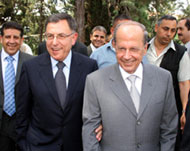Lebanon still struggling for cabinet
One month after legislative elections gave anti-Syrian groups a majority in parliament, Lebanon is still scrambling to form a new government in the face of mounting tensions with Damascus.

European foreign ministers, who gathered in Brussels, are to meet UN-Lebanese envoy Terje Roed-Larsen to discuss the impasse, a diplomatic source in Beirut said on Monday.
The situation at the Lebanese-Syrian border, where hundreds of trucks have been held up for days, the government crisis and the disarmament of Shia movement Hizb Allah’s armed wing are to be discussed at the meeting.
Damascus blames the border delays on a tightening up of security measures, while many Lebanese see a Syrian hand in the hold-ups and in the brief detention of nine Lebanese fishermen caught in Syrian territorial waters.
The fishermen were freed on Monday after a phone conversation between Lebanese President Emile Lahoud and his Syrian counterpart Bashar al-Assad, according to a statement from Lahoud’s office.
US and French officials have voiced concern over the failure to form a government after the four-stage election was wrapped up in June, the first held without Syrian presence in the country.
Political entente
Arab League Secretary-General Amr Moussa, on a visit to Damascus on Sunday, called for a “political entente” between the countries.
“The departure of Syrian forces from Lebanon does not signal the end of Syrian-Lebanese relations. A political entente is necessary between the two countries which must take into account the importance of the common interests that tie them,” Moussa said.
But the absence of a government has rendered impossible a resumption of dialogue between Beirut and Damascus to sort out the problems that have emerged since the last Syrian troops left in April.
 |
|
Many think Syria is smarting under |
Many Lebanese believe that Syria is smarting from the forced departure of its forces after a near 30-year stay.
“Syria has decided to no longer accord the facilities enjoyed by Lebanon in the past,” the Lebanese daily As-Safir quoted a senior Syrian source as saying on Monday.
“What’s happening isn’t going to improve Syria’s image in Lebanon.”
Lebanese Druze leader Walid Jumblatt told journalists that “there is no reason for the Lebanese people to pay the price” for the situation on Lebanon’s land and sea frontiers with Syria.
“What we’re seeing is a Syrian blockade, which is against the principles that should guide our relations following the departure of Syrian troops,” added MP Elias Atallah, leader of the Democratic Left movement.
Aoun’s role
Talks continued on Monday over forming a new government.
“The cabinet is due to be formed soon,” caretaker Prime Minister Nagib Miqati said following a meeting with Lahoud to discuss the Syrian-Lebanese crisis.
 |
|
Lahoud wants Aoun’s (R) group |
Having failed to form a government of national unity and then a cabinet of technocrats, Prime Minister-designate Fuad Siniora said on Friday he intended to form a government from a broad spectrum of parties and with the approval of the pro-Syrian Hizb Allah-Amal alliance.
“I’m patient, but patience has its limits. You have to recognise that there’s a new reality following the elections which gave the country a new majority,” Siniora said at the weekend.
He gave reassurances that the proposed government would include “a broad range of the political forces represented in parliament,” with the exception of former exiled Christian MP Michel Aoun.
But Lahoud has said that he wants Aoun’s group, which has 21 MPs in the 128-seat parliament, to take part in government in order for it to be truly representative.